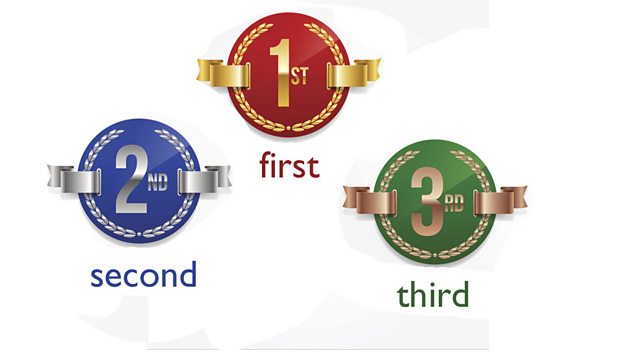Unit 5: The colleague from hell
Zero and first conditionals
Select a unit
- 1 Pop-ups
- 2 Hidden talents
- 3 Can't buy me love
- 4 Travellers' tales
- 5 The colleague from hell
- 6 Jurassic mystery: unpacking the past
- 7 Career changes
- 8 Art
- 9 Project management
- 10 The dog ate my homework!
- 11 The diary of a double agent
- 12 Fashion forward
- 13 Flat pack skyscrapers
- 14 Extreme sports
- 15 Food fads
- 16 Me, my selfie and I
- 17 Endangered animals
- 18 A nip and a tuck: cosmetic surgery
- 19 I'm really sorry...
- 20 Telling stories
- 21 Fakes and phrasals
- 22 Looking to the future
- 23 Becoming familiar with things
- 24 From rags to riches
- 25 Against the odds
- 26 Our future on Mars?
- 27 Where is it illegal to get a fish drunk?
- 28 Dodgy dating
- 29 Annoying advice
- 30 I'll have been studying English for thirty weeks
Session 1
First, second, third... twenty-ninth... In this session we're looking at the meaning, use and spelling of ordinal numbers. We'll meet a very disorganised man, and listen to 6 Minute Vocabulary!
Activity 2
First things first...
Eigth, eigthth, eighth?
As you heard in 6 Minute Vocabulary, spelling some ordinal numbers can be tricky. Take another look at our guidelines, and then try our spelling quiz.
Read the text and complete the activity

Spelling
1. We usually form ordinal numbers by adding the suffix -th to cardinal numbers:
- four - fourth
- eleven - eleventh
- thirty-seven - thirty-seventh
2. If we are writing using numbers, which we often do for dates and numbers over 10, we simply add the suffix -th to the number:
- 4th
- 11th
- 37th
3. One, two and three have irregular forms:
- first, second, third
- 1st, 2nd, 3rd
4. So do five, eight, nine, and twelve:
- fifth, eighth, ninth, twelfth
- 5th, 8th, 9th, 12th
5. Numbers ending in -y have irregular spellings. They drop the -y and replace it with -ieth:
- twentieth, fortieth, seventieth
6. Large numbers also follow this pattern:
- the hundredth time
- the thousandth man
- every billionth customer
To do
Do you remember all those rules? Prove your spelling power in our quiz.
Spell these first
7 Questions
Can you spell ordinal numbers correctly?
Help
Activity
Can you spell ordinal numbers correctly?
Hint
Numbers that end in -y take -ieth at the end, not numbers that end in -een, like 15.Question 1 of 7
Help
Activity
Can you spell ordinal numbers correctly?
Hint
The ordinal suffix goes at the end of the word.Question 2 of 7
Help
Activity
Can you spell ordinal numbers correctly?
Hint
Numbers that end in -y only drop the -y, not other letters.Question 3 of 7
Help
Activity
Can you spell ordinal numbers correctly?
Hint
Remember, 'third'Question 4 of 7
Help
Activity
Can you spell ordinal numbers correctly?
Hint
Which suffix goes after '7'?Question 5 of 7
Help
Activity
Can you spell ordinal numbers correctly?
Hint
Remember to only add the suffix after the last digit.Question 6 of 7
Help
Activity
Can you spell ordinal numbers correctly?
Hint
In British English, a million has six zeroes.Question 7 of 7
Excellent! Great job! Bad luck! You scored:
Next
Well done. Now it's time to test how well you know how to use ordinals in dates, and how to use them with articles and possessives. Ready?
Session Vocabulary
Ordinals - meaning and use
Ordinal numbers tell us the position of something in a group. They are used for:
1. Dates
It's the twelfth of November2. The order of events
Her fiftieth birthday3. Position in space
Our apartment's on the first floor
It's the third on the right4. Order of quality
The first prize in the competitionSpelling and form
We usually form ordinal numbers by adding -th to cardinal numbers:
four - fourth
first, second and third are irregular forms
fifth, eighth, ninth, twelfth and numbers ending in -y have irregular spellings: twentiethWe say dates with the and of:
the eighth of April
April the eighthBut we don't write them like that. We write them as:
8th April
April 8th
8 AprilFirst, second and third have the irregular suffixes 1st, 2nd and 3rd